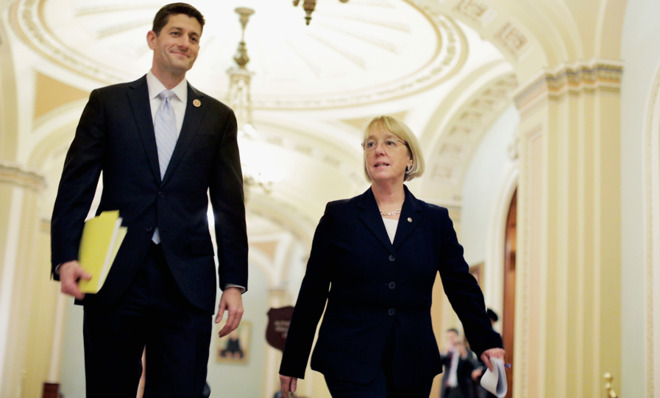There was nothing high-minded about the budget deal


A free daily email with the biggest news stories of the day – and the best features from TheWeek.com
You are now subscribed
Your newsletter sign-up was successful
Many recent articles have trumpeted the "bipartisan breakthrough" that led to a federal budget deal. Don't believe any of them. Partisan warfare is very much alive.
Rep. Paul Ryan (R-Wis.), a key broker of the budget deal, signaled that a standoff over the debt ceiling is coming soon.
Said Ryan: "We, as a caucus, along with our Senate counterparts, are going to meet and discuss what it is we want to get out of the debt limit. We don't want 'nothing' out of the debt limit. We're going to decide what it is we can accomplish out of this debt limit fight."
The Week
Escape your echo chamber. Get the facts behind the news, plus analysis from multiple perspectives.

Sign up for The Week's Free Newsletters
From our morning news briefing to a weekly Good News Newsletter, get the best of The Week delivered directly to your inbox.
From our morning news briefing to a weekly Good News Newsletter, get the best of The Week delivered directly to your inbox.
The comments show how broken our legislative system has become. Just days ago, Ryan agreed to a budget deal that increases the federal debt — and hailed it in a series of interviews — but now he won't agree to raise the debt ceiling mandated by the very same budget deal.
In the last fiscal standoff in October, the Obama administration held firm and refused to negotiate over the debt ceiling. Expect the same reaction this time.
Of course, the real reason there was a budget deal is that Republicans felt it was politically advantageous. With the White House on the defensive for nearly two months over the ObamaCare implementation, Republicans don't want to do anything to distract from their woes.
Newt Gingrich said it best: "I think this is mediocre policy and brilliant politics. It doesn't get them what they want on policy terms, but it strips away the danger that people will notice anything but ObamaCare. And the longer the country watches ObamaCare, the more likely the Democrats are to lose the Senate."
A free daily email with the biggest news stories of the day – and the best features from TheWeek.com
He's right. The budget deal probably is good politics — at least in the very short term.
So as both sides move the country to the edge of the fiscal brink early next year, remember it's all about politics. But will the politics still be good for either side?
Taegan D. Goddard is the founder of Political Wire, one of the earliest and most influential political websites. He also runs Wonk Wire and the Political Dictionary. Goddard spent more than a decade as managing director and COO of a prominent investment firm in New York City. Previously, he was a policy adviser to a U.S. senator and governor. Goddard is also co-author of You Won — Now What? (Scribner, 1998), a political management book hailed by prominent journalists and politicians from both parties. Goddard's essays on politics and public policy have appeared in dozens of newspapers across the country, including The Washington Post, USA Today, Boston Globe, San Francisco Chronicle, Chicago Tribune, Philadelphia Inquirer, and Christian Science Monitor. Goddard earned degrees from Vassar College and Harvard University. He lives in New York with his wife and three sons.
-
 The environmental cost of GLP-1s
The environmental cost of GLP-1sThe explainer Producing the drugs is a dirty process
-
 Greenland’s capital becomes ground zero for the country’s diplomatic straits
Greenland’s capital becomes ground zero for the country’s diplomatic straitsIN THE SPOTLIGHT A flurry of new consular activity in Nuuk shows how important Greenland has become to Europeans’ anxiety about American imperialism
-
 ‘This is something that happens all too often’
‘This is something that happens all too often’Instant Opinion Opinion, comment and editorials of the day
-
 The billionaires’ wealth tax: a catastrophe for California?
The billionaires’ wealth tax: a catastrophe for California?Talking Point Peter Thiel and Larry Page preparing to change state residency
-
 Bari Weiss’ ‘60 Minutes’ scandal is about more than one report
Bari Weiss’ ‘60 Minutes’ scandal is about more than one reportIN THE SPOTLIGHT By blocking an approved segment on a controversial prison holding US deportees in El Salvador, the editor-in-chief of CBS News has become the main story
-
 Has Zohran Mamdani shown the Democrats how to win again?
Has Zohran Mamdani shown the Democrats how to win again?Today’s Big Question New York City mayoral election touted as victory for left-wing populists but moderate centrist wins elsewhere present more complex path for Democratic Party
-
 Millions turn out for anti-Trump ‘No Kings’ rallies
Millions turn out for anti-Trump ‘No Kings’ ralliesSpeed Read An estimated 7 million people participated, 2 million more than at the first ‘No Kings’ protest in June
-
 Ghislaine Maxwell: angling for a Trump pardon
Ghislaine Maxwell: angling for a Trump pardonTalking Point Convicted sex trafficker's testimony could shed new light on president's links to Jeffrey Epstein
-
 The last words and final moments of 40 presidents
The last words and final moments of 40 presidentsThe Explainer Some are eloquent quotes worthy of the holders of the highest office in the nation, and others... aren't
-
 The JFK files: the truth at last?
The JFK files: the truth at last?In The Spotlight More than 64,000 previously classified documents relating the 1963 assassination of John F. Kennedy have been released by the Trump administration
-
 'Seriously, not literally': how should the world take Donald Trump?
'Seriously, not literally': how should the world take Donald Trump?Today's big question White House rhetoric and reality look likely to become increasingly blurred
